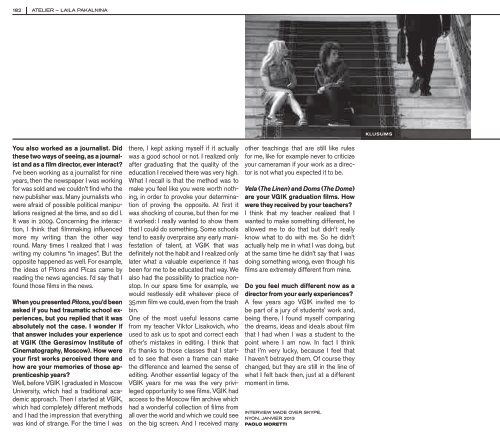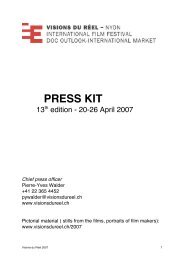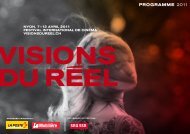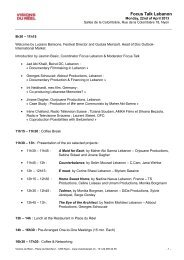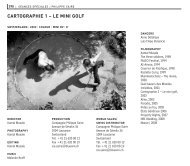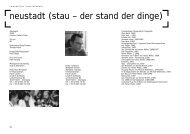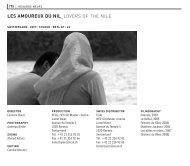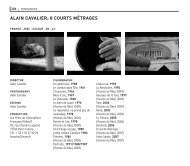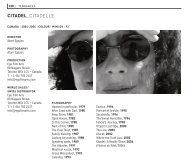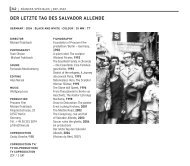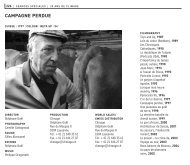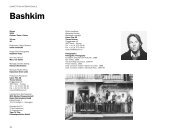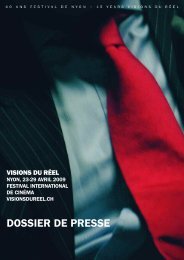Katalog 2013.pdf - Visions du Réel
Katalog 2013.pdf - Visions du Réel
Katalog 2013.pdf - Visions du Réel
You also want an ePaper? Increase the reach of your titles
YUMPU automatically turns print PDFs into web optimized ePapers that Google loves.
182 atelier – laila pakalnina<br />
Klusums<br />
You also worked as a journalist. Did<br />
these two ways of seeing, as a journalist<br />
and as a film director, ever interact<br />
I’ve been working as a journalist for nine<br />
years, then the newspaper I was working<br />
for was sold and we couldn’t find who the<br />
new publisher was. Many journalists who<br />
were afraid of possible political manipulations<br />
resigned at the time, and so did I.<br />
It was in 2009. Concerning the interaction,<br />
I think that filmmaking influenced<br />
more my writing than the other way<br />
round. Many times I realized that I was<br />
writing my columns “in images”. But the<br />
opposite happened as well. For example,<br />
the ideas of Pitons and Picas came by<br />
reading the news agencies. I’d say that I<br />
found those films in the news.<br />
When you presented Pitons, you’d been<br />
asked if you had traumatic school experiences,<br />
but you replied that it was<br />
absolutely not the case. I wonder if<br />
that answer includes your experience<br />
at VGIK (the Gerasimov Institute of<br />
Cinematography, Moscow). How were<br />
your first works perceived there and<br />
how are your memories of those apprenticeship<br />
years<br />
Well, before VGIK I gra<strong>du</strong>ated in Moscow<br />
University, which had a traditional academic<br />
approach. Then I started at VGIK,<br />
which had completely different methods<br />
and I had the impression that everything<br />
was kind of strange. For the time I was<br />
there, I kept asking myself if it actually<br />
was a good school or not. I realized only<br />
after gra<strong>du</strong>ating that the quality of the<br />
e<strong>du</strong>cation I received there was very high.<br />
What I recall is that the method was to<br />
make you feel like you were worth nothing,<br />
in order to provoke your determination<br />
of proving the opposite. At first it<br />
was shocking of course, but then for me<br />
it worked: I really wanted to show them<br />
that I could do something. Some schools<br />
tend to easily overpraise any early manifestation<br />
of talent, at VGIK that was<br />
definitely not the habit and I realized only<br />
later what a valuable experience it has<br />
been for me to be e<strong>du</strong>cated that way. We<br />
also had the possibility to practice nonstop.<br />
In our spare time for example, we<br />
would restlessly edit whatever piece of<br />
35 mm film we could, even from the trash<br />
bin.<br />
One of the most useful lessons came<br />
from my teacher Viktor Lisakovich, who<br />
used to ask us to spot and correct each<br />
other’s mistakes in editing. I think that<br />
it’s thanks to those classes that I started<br />
to see that even a frame can make<br />
the difference and learned the sense of<br />
editing. Another essential legacy of the<br />
VGIK years for me was the very privileged<br />
opportunity to see films. VGIK had<br />
access to the Moscow film archive which<br />
had a wonderful collection of films from<br />
all over the world and which we could see<br />
on the big screen. And I received many<br />
other teachings that are still like rules<br />
for me, like for example never to criticize<br />
your cameraman if your work as a director<br />
is not what you expected it to be.<br />
Vela (The Linen) and Doms (The Dome)<br />
are your VGIK gra<strong>du</strong>ation films. How<br />
were they received by your teachers<br />
I think that my teacher realized that I<br />
wanted to make something different, he<br />
allowed me to do that but didn’t really<br />
know what to do with me. So he didn’t<br />
actually help me in what I was doing, but<br />
at the same time he didn’t say that I was<br />
doing something wrong, even though his<br />
films are extremely different from mine.<br />
Do you feel much different now as a<br />
director from your early experiences<br />
A few years ago VGIK invited me to<br />
be part of a jury of students’ work and,<br />
being there, I found myself comparing<br />
the dreams, ideas and ideals about film<br />
that I had when I was a student to the<br />
point where I am now. In fact I think<br />
that I’m very lucky, because I feel that<br />
I haven’t betrayed them. Of course they<br />
changed, but they are still in the line of<br />
what I felt back then, just at a different<br />
moment in time.<br />
Interview made over skype,<br />
Nyon, Janvier 2013<br />
Paolo Moretti


